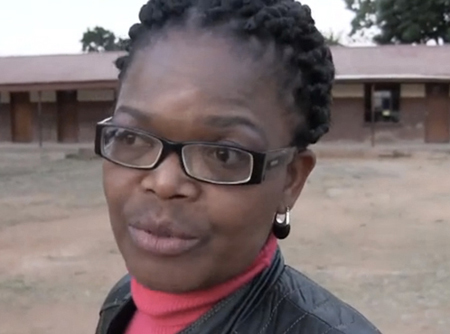
Beatrice Mtetwa visiting her old elementary school. Image taken from the film “Beatrice Mtetwa and the Rule of Law”
“You know this has to be done, somebody has to do it, and why shouldn’t it be you?” That’s how Zimbabwe’s Beatrice Mtetwa answers the question of why she risks her life defending victims of Robert Mugabe’s regime. For over two decades Beatrice has been a human rights lawyer in a country ranked near the bottom of the World Justice Project’s Rule of Law Index. Twice she has been severely beaten and jailed. Her phones and computers have been hacked, her dogs poisoned, her movement has been tracked.
A few days ago, she attempted to aid a client whose home was being raided by police. When she demanded to see the search warrant, she was arrested while police went ahead with a warrantless search. Beatrice was charged with “obstructing justice” and was jailed, where she remains. [UPDATE: Mtetwa was released on March 25. See note below.]
I came to know Beatrice through Andrew Meldrum, a 2008 Nieman Fellow who is now assistant Africa editor for The Associated Press in Johannesburg, South Africa. Beatrice had defended him in 2002 when he was charged with “publishing false news” for reporting on the torture of black Zimbabweans by the Mugabe regime. Although Beatrice was able to gain Andrew’s acquittal, he was forcibly deported as a “prohibited immigrant” soon after the verdict was announced. Beatrice was with Andy as state police surrounded him, threw a hood over his head, and pushed him into the back seat of a car. “I was really afraid for him because those were the days when people just disappeared and were tortured,” she told me.
Hearing Andy speak about Beatrice’s work inspired me to pursue a film about Zimbabwe and to do it through the prism of the rule of law. I enlisted the help of Hopewell Chin'Ono, a 2010 Nieman Fellow and a Zimbabwean filmmaker, who is co-producer of the film.
After Beatrice agreed to participate in the film I traveled to Zimbabwe twice in 2012. Working with Hopewell, who lives in Harare and works for ITN, I filmed Beatrice and several of her defendants. I also traveled with Beatrice to her family’s farm in adjacent Swaziland. There, I met many of her siblings—she is the eldest of 50 children—and three of her father’s six wives. We also visited her elementary school where a teacher told her she “had potential” and that “you can be whatever you want to be.” For Beatrice, that meant getting out of the village life. “I knew I didn’t want to be carrying babies on my back,” she told me.
Her father agreed to pay her school fees and after graduating from Scotland’s University of Edinburgh and from law school in Botswana, she made her way to Zimbabwe soon after it gained its independence in 1980. Like most others, she had high hopes for Mugabe and Zimbabwe. A few years later, she said, “The wheels literally fell off” of the Mugabe regime and she dedicated her legal efforts to defending those who were jailed for opposing the regime.
Today Beatrice sits in the same jail she has visited many times while fighting to free others. That’s a loss for the people of Zimbabwe and for those throughout Africa who aspire to live under the rule of law.
Lorie Conway, a 1994 Nieman Fellow, is an independent filmmaker and producer. Watch the trailer for “Beatrice Mtetwa and the Rule of Law” and follow Conway’s project at @ruleoflawfilm and on Facebook.
Author's Note, March 25, 2013
Today after spending one week in jail on charges of "obstructing justice" Beatrice Mtetwa was freed on $500. bail. She can now return to her work fighting for justice and the rule of law in Zimbabwe.
Beatrice's arrest has become a tipping point within the country and is helping to mobilize the forces of change. In the months leading up to the presidential election in July Beatrice Mtetwa will no doubt continue to be an inspiring presence and a role model for all.


